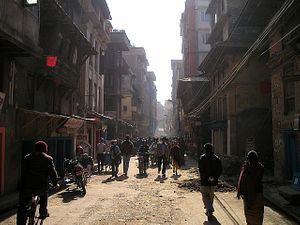As I discussed last week, Nepal’s new prime minister, Pushpa Kamal Dahal (or “Prachanda”) dispatched twin special envoys to New Delhi and Beijing to right the small Himalayan nation’s diplomacy following his predecessor’s sharp divergence with India–historically Nepal’s closest partner and benefactor–in favor of China. It appears now that his endeavor is showing some early signs of success, with New Delhi having warmly received Bimalendra Nidhi, Prachanda’s deputy prime minister.
Prashant Jha over at the Hindustan Times reports that Nidhi’s time in New Delhi strongly suggests that Prachanda’s attempts at rapprochement are succeeding. “The PM is aware that Nepal’s development is not possible without cooperation with India, and wants to convey his deep commitment to the relationship,” Nidhi reportedly told Indian Prime Minister Narendra Modi. In return, Modi said “Please tell [Prachanda] that while the government will of course welcome him, I will personally welcome him to India.”
Critically, Nidhi reportedly addressed India’s involvement in Nepal’s constitution-drafting process head on. Part of the reason Kathmandu and New Delhi drifted apart over the last 12 months was due to India siding with Nepal’s Madhesi and Tharu ethnic groups as they protested the country’s newly promulgated constitution. (More on the origins of those protests here.) Delhi’s support for these communities, who are largely based in Nepal’s southern plains and share cultural and linguistic ties across the border, irked many in Nepal’s Kathmandu-based political elite–certainly former prime minister Khadga Prasad Oli.
Nidhi, in Delhi, reminded Modi of his 2014 speech to Nepal’s Constituent Assembly: “Some of your phrases have become household phrases in Nepal…You also told us to take everyone along in the constitution-writing process. Our government is committed to it.” Nidhi, himself a Madhesi, also hails from the Nepali Congress–the party allied with Prachanda’s Maoists. Beyond flattery and diplomatic niceties, it seems that the Nepali Congress’ involvement in Nepal’s new government could also help circumscribe Kathmandu’s foreign policy. Prachanda, during his former stint as prime minister in 2008-2009, was far more critical of Nepal’s historic ties with India, including the 1950 bilateral friendship treaty, than his current demeanor lets on.
For India, the restoration of good ties with Nepal will be a welcome development. Modi’s government, since coming to power in 2014, made India’s neighborhood a diplomatic priority. While Sri Lanka and Bangladesh saw notable improvements, the decline in bilateral ties with Nepal over the last 12 months was a particular low point for a historically strong relationship. Politically, matters remain fragile in Kathmandu after Oli’s dramatic failure to withstand a no-confidence motion. Prachanda will serve as prime minister for nine months under the agreement reached between the Maoists and the Nepali Congress. Sher Bahadur Deuba, the president of the Nepali Congress, will then take over. Fortunately for New Delhi, he’s also spoken out in favor of good ties with India.
































